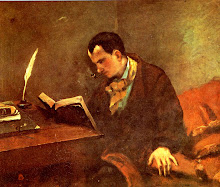Mixing the pagan with the Christian is an interesting thing for a Catholic to do. But I think that Augustine realizes that there are valuable things to learn from the ancient orators. He cites Cicero quite frequently and it's always relevant to his idea of rhetoric, which he has baptized Christian in "On Christian Doctrine." His mix of ideas reminds me a bit of Eliot's "The Wasteland." Eliot combines many elements of different religions as well as pagan ideals to get a good, sort of moral point across, much like Augustine does.
Augustine recognizes that bad people may use eloquence to sway a crowd, which is sort of the topic we were discussing in class last week. Augustine clears it up for me. Though the wicked may employ eloquence for their dastardly deeds, their actions don't match with their speech, making them irrelevant. He says "For how can they express in words what they do not express in deeds" (377). This contrast between what you say and what you do makes a lot of sense to me.
Augustine places a lot of importance on practice of rhetoric rather than just learning the rules. He says that basically if you want to learn rhetoric you should learn by example, studying past speeches, which follow all the rules you need to know anyway. However, if you don't have wisdom behind your eloquence, anything you learned is pretty much useless. In this case, Augustine says you must know the Scripture to back up your eloquence, "For those who speak eloquently are listened to with pleasure; those who speak with wisdom are heard with profit" (363).
Different from Cicero, Augustine says that you should pray to aid your speeches. He says that you should pray to know the material and pray for the crowd so that they will absorb and understand what it is that you are trying to get across. He has given the reader a pretty detailed guide to good speaking already and yet he still keeps the religious aspect which the reader doesn't even need for persuasive speech. The religious aspect throughout the essay fits surprisingly well with rhetoric. Instead of trying to convince a crowd about the innocence or guilt of a person, or about the function of art, Christians were vying for conversion, which doesn't deal with human law, but with human souls. Persuading someone to save their eternal souls seems less pressing than persuading a group to save someone's life.

Linda Daly
ReplyDeleteSaving one's eternal soul sounds like quite a charge to me. Eternity is after all endless. But then again a human life is precious and once it is gone, it cannot be gotten back. Given a choice the individual might chose to save either one, depending on their belief in the hereafter. I would think a crowd might respond very much the same as the individual.
"For how can they express in words what they do not express in deeds?" I think this is idealism. It would be nice if this were the way things were but we all know it isn't true. I think that the mention of the orator/rhetorician as the good man is something brought up to try and convince people with bad intentions that they could not (and thusly SHOULD not) be interested in rhetoric. How can we judge an audience who has yet to hear the orator/rhetorician with bad intentions? Textually, however, our readings have proven that this is impossible because an evil man simply does not have the mental power to come close to being a decent rhetorician.
ReplyDeleteIt's not just idealism. There are plenty of instances in public life where someone's credibility on a given issue is compromised by their actions. Doesn't mean that everyone has to be perfect before they speak, but being openly hypocritical DOES undermine your position.
ReplyDelete